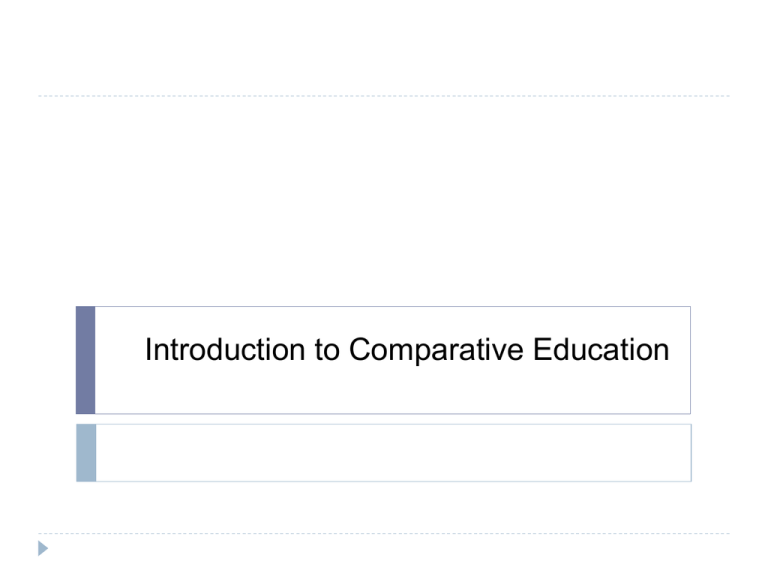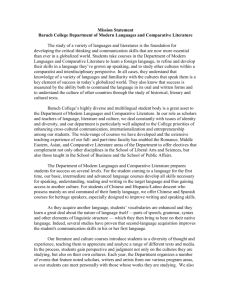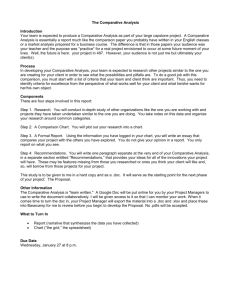Introduction to Comparative Education
advertisement

Introduction to Comparative Education Concept of Education ● ● The tool for the integration of the individual effectively into a society so that the individual can achieve selfrealization, develop national consciousness, promote unity and strive for social, economic, political, scientific cultural and technological process. Adesina (1985) Nduka (1982) sees the concept as the process of cultural transmission of the people at least part of such culture from one generation to the next. Concept of Education ● ● Education is the transmission of wisdom and knowledge of the society from one generation to the next and also to prepare the young people for their future membership of the society in which they find themselves. Nyerere (1982) 1) Developing the capacities and potential of the individual so as to prepare that individual to be successful in a specific society or culture. From this perspective, education is serving primarily an individual development function. 2) The process by which society transmits to new members the values, beliefs, knowledge, and symbolic expressions to make communication possible within society. In this sense, education is serving a social and cultural function. The Meaning of Comparative Education Adeyinka (1994) gives the following definitions for the concept. ● (a) A study of two or more education systems. ● (b) A study of how the philosophy, objectives and aims, policy and practice of education in other countries influence the general development, policy and practice of education in a particular country. ● (c) A study of how the development of education in the past, across the ages and continents, has influenced the development of education in particular countries. ● (d) A study of the school systems of two or more countries, and of the administrative machineries set up to implement or to control the implementation of government policies at various levels of education systems. Concept of Comparative Education ● ● ● ● Comparative Education according to Good (1962) is a field of study dealing with the comparison of current educational theory and practice in different countries for the purpose of broadening and deepening understanding of educational problems beyond the boundaries of one's own country. Comparative education goes beyond the comparison of education philosophies but also includes the comparison of the real education practices. Kandel A systematic examination of other cultures and other systems of education deriving from those cultures in order to discover resemblances and differences, and why variant solutions have been attempted (and with what result) to problems that are often common to all. Mallinson (1975) Adejumobi (1994) defines the concept as a critical study of educational similarities and differences prevailing with a particular society or culture or among various societies and cultures. The Scope of Comparative Education The term "scope" according to Longman dictionary of contemporary English could mean: ● Space or chance for actions or thought. Subjects from where Comparative Education draws its contents include the following: ● (a) History of Education (b) Philosophy of Education (c) Sociology of Education (d) Anthropology (e) Economics (f) Geography (g) Psychology (h) Statistics (i) Literature (j) Political geography (k) Political science and (l) The International relations. The Purpose of Comparative Education Hans (1992) concludes that: ● The analytical study of these factors from historical perspective and the comparison of attempted solution of resultant problems are the main purpose of comparative education. ● To become familiar with what is being done in some countries ... and why it is done, is a necessary part of the training of all students of educational issues of the day. Mallinson (1975) ● The purpose of Comparative Education is to perfect national systems with modifications and changes which the circumstances and local conditions would demand. Hans (1992) Reasons for Studying Comparative Education ● ● ● ● ● ● ● ● ● ● (a) To assist in the understanding of one's educational institutions as well as educational practices. (b) To assist in the understanding of the factors that are responsible for various educational changes. (c) To educate the students and teachers on the procedure through which educational changes occur. (d) To contribute not only to the educational development of the society but also to the general development of the society. (e) To serve as an academic discipline. (f) To assist in solving one's educational problems (g) To open one's eyes to the educational philosophies, theories and practices of other countries. (h) To assist both the students and teachers of discipline in gathering reliable information concerning educational system. (i) To assist in the Promotion of international relationship. (j) To contribute to the formulation of a country's educational systems. Assignments ● ● ● ● ● Analyse the concept of Education according to various definitions provided and develop your own definition of Education Also justify any definition that mostly appeals to you Critically evaluate the concept of Comparative Education in light of various authors Present purposes of Comparative Education (Oral Presentation with the support of arguments) Present various reasons of studying comparative education (Oral presentation with the support of arguments)



